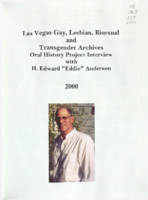Search the Special Collections and Archives Portal
Search Results

Transcript of interview with Raymonde Fiol by Barbara Tabach, August 12, 2015
Date
Archival Collection
Description
In this interview, Fiol discusses her experience as a a hidden child in the Holocaust and her family's history. She also talks about her involvement with the Las Vegas Holocaust survivors group.
Raymonde "Ray" Fiol is president of the Holocaust Survivors Group of Southern Nevada. A Jewish Holocaust survivor whose parents were killed in Auschwitz, Fiol was hidden by a Christian family of Resistance fighters during her childhood in Nazi-occupied Paris, France. She married American serviceman Phil Fiol and left Paris in 1957. The couple lived in New York City where she worked in inventory control. She retired to Las Vegas, Nevada around 2003 and became active in the local Holocaust Survivors Group. In 2007, she became president of the organization, which provides essential services to Holocaust survivors and helps them share their stories. Fiol is also a member of the Nevada Governor?s Advisory Council on Education Relating to the Holocaust and the coordinating council of Shoah International. Her dedication to preserving the memory of the Holocaust and caring for survivors earned her the Nevada Senior Citizen of the Year award from the Nevada Delegation of the National Silver Haired Congress and the Aging Services Directors Organization in 2014, and in 2013 she was named Mensch Volunteer of the Year by the Jewish Federation of Las Vegas. In this interview, Ray reflects upon her traumatic childhood experiences, and shares how she learned details of her family?s history from a woman in France who had researched the destiny of the local Jewish community. She also discusses her involvement with the survivors group, and the positive impacts of its outreach activities, as well as goals to ensure future generations learn about, and from, the Holocaust.
Text
Stuart, I.F., and Anderson, R.O. 1999. "Owl Creek Energy Project: A Solution to the Spent Fuel Temporary Storage Issue." WM 9 Proceedings, Feb. 28- Mar. 04, 1999. Tucson, Arizona: "HLW, LLW, Mixed Wastes and Environmental Restoration-Working Towards Cleaner Environment. La Grange Park, Illinois: American Nuclear Society, 1999
Level of Description
Archival Collection
Collection Name: Environmental Radiation Protection Standards for Yucca Mountain, Nevada
Box/Folder: Box 44
Archival Component
#69903: UNLV's Black Mountain Institute holds "Blood, Sweat & Tears: Life on the Front Lines of the Human Rights Struggle in Russia, Nigeria, and Iran" with authors Azar Nafisi and Wole Soyinka moderated by UNLV history professor Michelle Tusan September 11, 2014 at the University of Nevada, Las Vegas, 2014 September 11
Level of Description
Archival Collection
Collection Name: University of Nevada, Las Vegas Creative Services Records (2010s)
Box/Folder: Digital File 00
Archival Component
Albin, A.L.; Singleton, W.L.; Moyer, T.C.; Leo, A. C. ; Lung, R.C.; Eatman. G.L.W.; and Barr, D.L. 1997. Geology of the Main Drift - Station 28+00 to 55+00, Exploratory Studies Facility, Yucca Mountain Project. Yucca Mountain, Nevada Milestone SPG42AM3. Denver, Colorado: Bureau of Reclamation and U S. Geological Survey, 1997
Level of Description
Archival Collection
Collection Name: Environmental Radiation Protection Standards for Yucca Mountain, Nevada
Box/Folder: Box 29
Archival Component

Transcript of interview with Gilbert D. Yarchever by Claytee White, 2006
Date
Archival Collection
Description
Gilbert Yarchever was one of nine siblings, born and bred in Pittsburgh, Pennsylvania. He describes the way his mother?s family was granted the last name of ?Kurfeersf" by Emperor Franz Joseph (of Austria-Hungary), explains the Seder (the Jewish observation of the exodus of Hebrews from Egypt), and tells what it was like to survive the Depression. Gilbert describes the jobs he held after high school and the government examination he took that led to his lifetime of adventure and travel. He moved to Washington, D.C., in 1940 and kept himself busy working for the government and taking classes at George Washington University, as well as working part time at Hecht Department Store and as a freelance court reporter. Following the attack on Pearl Harbor in 1941, Gilbert was sent to Africa on a merchant ship, helped smuggle Jewish survivors into Jerusalem, and was assigned the task of negotiating with Arab sheikhs for laborers to build a road. In the years after that, he worked in Europe, Panama, Alaska, Japan, and Hawaii and describes many of the jobs he was responsible for and many of the individuals he met. He also married and had children, kept up with university classes whenever he could, and collected art objects and paintings. Following his retirement in 1977, Gilbert and his family came to Las Vegas and bought a condo in Regency Towers. He did some consulting work for a couple of years, and then he and his wife began traveling around the states and going abroad. He was involved with UNLV?s EXCEL program, the music department, and the Las Vegas Art Museum. (He and his second wife Edythe presented the first major exhibition on Holocaust art at the museum.) These days Gilbert often donates pieces from his art collection to churches, synagogues, and charitable organizations.
Gilbert Yarchever was in the Navy during World War II, helped smuggle Jewish refugees into Jerusalem, worked as a civil servant in many countries, and moved to Las Vegas in 1977. He helped found the EXCEL program at University of Nevada, Las Vegas and was an art collector with his wife, Edythe Katz-Yarchever.
Text

Transcript of interview with Edward "Eddie" Anderson by Dennis McBride, October 11-14, 2000
Date
Archival Collection
Description
Dennis McBride interviews Eddie Anderson (born 1946) about his role in advocating for LGBT rights, specifically his participation in the various political and social movements during previous decades. The interview begins with a discussion of Anderson’s background, including his experiences growing up in children’s homes and living with his grandparents. Anderson mentions marching with his grandparents for both workers’ and women’s rights as some of his first political involvements. Anderson also discusses his original aspirations for becoming a priest as well as his memories of meeting President John F. Kennedy during a visit to his high school when Anderson was student body president. Anderson then discusses travelling to the South, specifically in Selma, Alabama, during one summer while in high school in order to help register Black voters. Anderson then discusses his friendship with Nevada Senator Bill Raggio and his wife, and his joining of the U.S. Navy, where he met President Ri
Text
Audio clip from interview with Nathaniel Whaley by John Grygo, March 6, 2013
Date
Archival Collection
Description
In this clip, Nathaniel Whaley talks about the differences between the opportunities for weekend entertainment for black and white young people in Las Vegas in the 1940s and 1950s.
Sound
Audio clip from interview with Ruby Amie-Pilot, August 7, 2012
Date
Archival Collection
Description
Part of an interview with Ruby Amie-Pilot on August 7, 2012. In this clip Amie-Pilot talks about plans to picket Floyd Patterson fight at the Las Vegas Convention Center, because blacks not allowed to attend.
Sound
Audio recording clip from an interview with James Jones Jr. by Barbara Tabach, February 28, 2013
Date
Archival Collection
Description
Part of an interview of James Jones, Jr. conducted by Barbara Tabach, February 28, 2013 . Jones Jr. highlights his work opportunities and racism in 1959 Las Vegas. In the clip, Jones Jr. discusses his first job in Las Vegas, where he became ill after four hours, and his subsequent job at a neighborhood grocery store.
Sound
